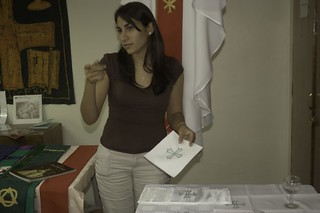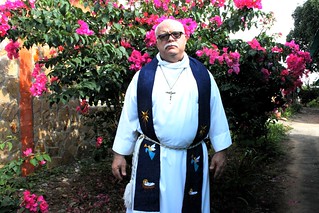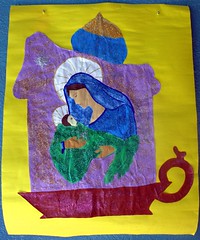Anyway, our Christmas party for the preschool was Friday, November 29. During the opening devotion, the children sang “Din, din, din”, a traditional Venezuelan Christmas carol about Joseph and Mary preparing to leave on their journey to Bethlehem.

 On December 1, the first Sunday in Advent, the altar was lit with blue candles and for the first time I wore a blue stole, made for me by Yoxandris Marcano de Maita, the wife of Pastor Sergio Maita of Cristo Rey Lutheran Church in the city of Maturin in the eastern Venezuelan state of Monagas. This particular shade of blue is called “Sarum blue” because it was used as a liturgical color in the Sarum Rite, a pre-Reformation version of the Latin Mass used in southern England from the 11th to the 16th centuries (“Sarum” is the old Roman name for Salisbury, England). Blue was used as a liturgical color in the Mozarabic Rite, a form of the Mass used throughout Spain and Portugal during the days when Muslims ruled most of the Iberian Peninsula. Also, I understand that the blue has long been a traditional Advent color in the Lutheran Church of Sweden. Dark blue is used as a liturgical color in the Eastern Orthodox churches, but typically during Lent.
The predominant practice in Western Christendom has been to use purple as the liturgical color of both Advent and Lent, but recently there has been a revival of the use of blue during Advent.
On December 1, the first Sunday in Advent, the altar was lit with blue candles and for the first time I wore a blue stole, made for me by Yoxandris Marcano de Maita, the wife of Pastor Sergio Maita of Cristo Rey Lutheran Church in the city of Maturin in the eastern Venezuelan state of Monagas. This particular shade of blue is called “Sarum blue” because it was used as a liturgical color in the Sarum Rite, a pre-Reformation version of the Latin Mass used in southern England from the 11th to the 16th centuries (“Sarum” is the old Roman name for Salisbury, England). Blue was used as a liturgical color in the Mozarabic Rite, a form of the Mass used throughout Spain and Portugal during the days when Muslims ruled most of the Iberian Peninsula. Also, I understand that the blue has long been a traditional Advent color in the Lutheran Church of Sweden. Dark blue is used as a liturgical color in the Eastern Orthodox churches, but typically during Lent.
The predominant practice in Western Christendom has been to use purple as the liturgical color of both Advent and Lent, but recently there has been a revival of the use of blue during Advent.Of course, many of the members of our congregation are very young, so I try not to overload them with information. I simply explained that we were using this shade of blue because it was the color of the predawn sky just before the first rays of the sun break the horizon. Thus it symbolizes our hope and anticipation of the light of Christ breaking into a dark world.
The appointed sermon text was Luke 3:1-6. “Now in the fifteenth year of the reign of Tiberius Cæsar, Pontius Pilate being governor of Judæa, and Herod being tetrarch of Galilee, and his brother Philip tetrarch of Ituraea and of the region of Trachonitis, and Lysanias the tetrarch of Abilene, Annas and Caiaphas being the high priests, the word of God came unto John the son of Zacharias in the wilderness. And he came into all the country about Jordan, preaching the baptism of repentance for the remission of sins; As it is written in the book of the words of Esaias the prophet, saying, The voice of one crying in the wilderness, Prepare ye the way of the Lord, make his paths straight. Every valley shall be filled, and every mountain and hill shall be brought low; and the crooked shall be made straight, and the rough ways shall be made smooth; And all flesh shall see the salvation of God.”
 I might also have used John 1:5-9. "And the light shineth in darkness; and the darkness comprehended it not. There was a man sent from God, whose name was John. The same came for a witness, to bear witness of the Light, that all men through him might believe. He was not that Light, but was sent to bear witness of that Light. That was the true Light, which lighteth every man that cometh into the world. “
I might also have used John 1:5-9. "And the light shineth in darkness; and the darkness comprehended it not. There was a man sent from God, whose name was John. The same came for a witness, to bear witness of the Light, that all men through him might believe. He was not that Light, but was sent to bear witness of that Light. That was the true Light, which lighteth every man that cometh into the world. “Repentance is not as when a thief in jail feels sad about his crimes because the result was jail. True repentance is when a thief changes his mind to acknowledge his sin against God, and rebellion against God. It is the same with each of us. Repentance is a change of mind and heart to reject the sin in us. If we do not recognize the darkness inside of us, what does the death of Christ for us? Nothing. So, we must preach the Law before the Gospel. The Holy Spirit works in the preaching of both Law and Gospel to touch the human heart, to convert our minds and hearts to true repentance, and to faith in Christ.
The true penitent will not seek to escape the short-term consequences of his own sins, but rather seeks to make right that which was wrong, even at his own cost, knowing that Christ has set us all free from the long-term consequence of our sin and restored us to a right relationship with God. With heart and mind illumined by the Holy Spirit as to what Christ has done for us, the penitent sinner, having received a second opportunity to live as a child of God, seeks with God's help to avoid falling back into the darkness of his own heart. He does not try to justify himself before God by his own works, but avoids that which obscures the light of God's love in confident expectation that the trials of this life are only for a short time.
Thus St. Paul writes in the epistle for the first Advent Sunday (Romans 13:11-14), "And that, knowing the time, that now it is high time to awake out of sleep: for now is our salvation nearer than when we believed. The night is far spent, the day is at hand: let us therefore cast off the works of darkness, and let us put on the armour of light. Let us walk honestly, as in the day; not in rioting and drunkenness, not in chambering and wantonness, not in strife and envying. But put ye on the Lord Jesus Christ, and make not provision for the flesh, to fulfill the lusts thereof."

No comments:
Post a Comment